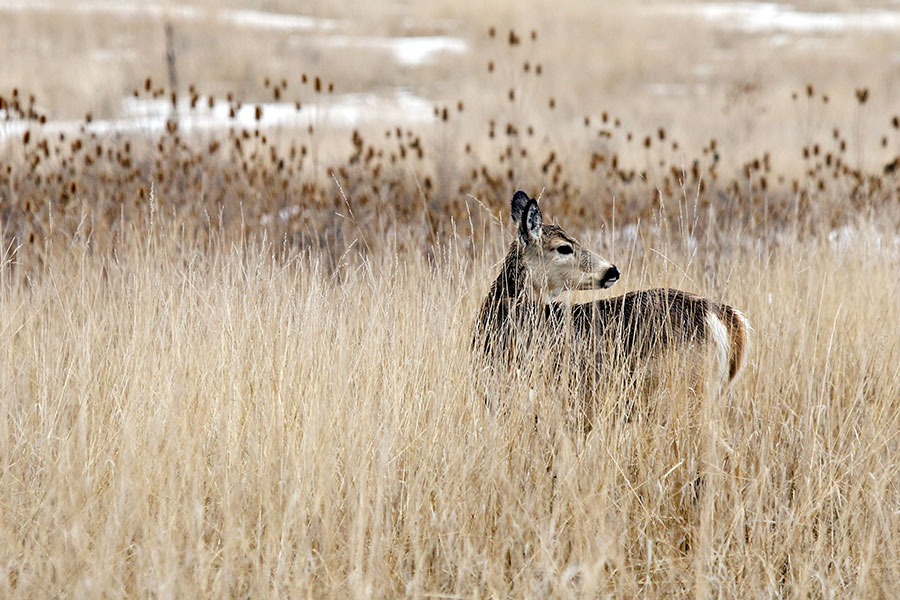A white-tailed deer that was road-killed near the Lincoln County landfill is suspected to be positive of chronic wasting disease, marking the seventh detection of the fatal illness that is alarming wildlife managers and hunters.
The continued detections of infected deer in Lincoln County has prompted officials with Montana Fish, Wildlife and Parks to implement a special hunt inside a new Libby chronic wasting disease (CWD) management zone, which lies inside a 10-mile radius around Libby. The management zone includes hunting districts 100, 103 and 104.
The hunt will occur at the same time as the archery and general hunting season and follow the same regulations for dates, weapon restrictions and access.
The goal of the special hunt is to identify the prevalence and distribution of CWD. The 600 hunting licenses sold out within about two hours of going on sale in August.
Montana Fish, Wildlife and Parks (FWP) wildlife officials collected the carcass of the most recent deer, an adult doe, on Aug. 26 along Pipe Creek Road and submitted it to the Veterinary Diagnostic Lab at Colorado State University in Fort Collins, Colo., for testing. The lab identified the sample to be suspected of CWD infection and will run a second test for confirmation.
If confirmed, the new result marks the seventh detection of CWD in the Libby area. The first detection, which occurred in late May, marked the first time CWD was detected west of the Continental Divide in the wild. The positive detections have all involved white-tailed deer.
Through Sept. 6, FWP has submitted 117 samples for CWD testing from the Libby area.
All deer, elk and moose harvested within the Libby CWD Management Zone, including any harvested with a Libby Special CWD Hunt B license and any harvested with any other type of license, must be checked and sampled within three days of harvest. Hunters who quarter or bone out their animal in the field must bring the head for sampling.
Before Oct. 26, hunters who successfully harvest an animal are required to bring the head to the FWP Libby Office at 385 Fish Hatchery Rd. A collection site will be set up for hunters to self-report and submit the head for testing.
During general big game season (Oct. 26 to Dec. 1), the Libby Special CWD Hunt Sampling Station (the Montana Department of Transportation shop on U.S. Highway 2, mile marker 35) will be open every day from 11 a.m. to one-and-a-half hours after sunset. Hunters are only required to stop at the station if they harvested an animal. The Canoe Gulch Check Station will be open weekends from 11 a.m. to one-and-a-half hours after sunset during the general season, and all hunters, with or without game, passing the check station must stop.
Hunters will be required to document the exact location of the kill. Animals will be tagged with a unique identification number. Hunters can use that identification number to look up test results on the FWP website at fwp.mt.gov/CWD. Test results are usually available within three weeks. Hunters who harvest an animal that tests positive for CWD may receive a replacement 2019 license.
To reduce the spread of CWD, whole carcasses, whole heads or spinal columns cannot be taken out of the Libby CWD Management Zone unless the animal has tested negative for CWD. Hunters are strongly encouraged to dispose of hides, bones and trimmings at approved landfills such as the Lincoln County Landfill. The spinal column may be left at the kill site but requires landowner permission if on private land. If the carcass is processed within the CWD Management Zone, any brain and spinal parts must be discarded in the Lincoln County Landfill.
CWD is a progressive, fatal disease affecting the nervous system of mule deer, white-tailed deer, elk and moose. There is no known transmission of CWD to humans or other animals, including pets or livestock. The Centers for Disease Control and Prevention (CDC) recommends that hunters harvesting a deer, elk or moose from an area where CWD is known to be present have their animal tested for CWD prior to consuming the meat, and to not consume the meat if the animal tests positive.
